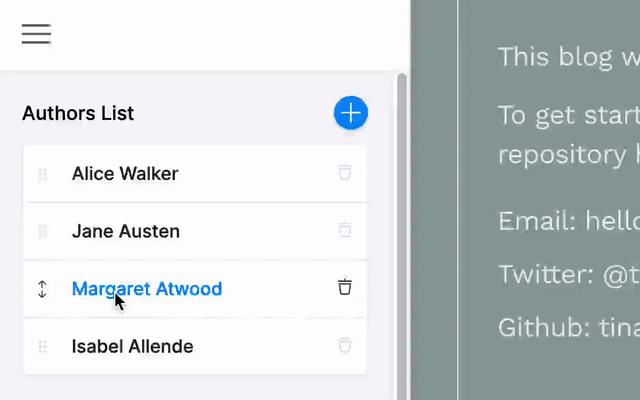Group-List Field
Table of Contents
This is an advanced-use feature, and likely not something you'll need to configure. What you probably want is the content types reference!
The Group List field represents a list of group fields. This field exports an array of objects.
Use this field when you want to support multiple entities that all have the same shape. Each entity will appear in a list where you can add and delete them. You can then click into an entity to edit its individual fields according to the Group List's field definition.

Options
import { Field } from '@tinacms/core'interface GroupListConfig {component: 'group-list'name: stringfields: Field[]label?: stringdefaultItem?: object | (() => object)itemProps?(item: object): {key?: stringlabel?: string}}
| Option | Description |
component | The name of the plugin component. Always 'group-list'. |
name | The path to some value in the data being edited. |
fields | An array of fields that will render as a sub-menu for each group item. The fields should map to editable content. |
label | A human readable label for the field. Defaults to the name. (Optional) |
description | Description that expands on the purpose of the field or prompts a specific action. (Optional) |
defaultItem | A function to provide the group-list item with default data upon being created. (Optional) |
itemProps | A function that generates props for each group item. It takes the item as an argument. (Optional) It returns an object containing, key: This property is used to optimize the rendering of lists. If rendering is causing problems, use defaultItem to generate a new key, as is seen in this example. Feel free to reference the React documentation for more on keys and lists. label: A readable label for the new group-list item. |
This interfaces only shows the keys unique to the group-list field. Visit the Field Config docs for a complete list of options.
Definition
Below is an example of how a group-list field could be defined in a JSON form.
For example, if we had a list of authors in a JSON file:
{"author": [{"name": "Alice Walker","id": "alice-walker","best-novel": "The Color Purple"},{"name": "Margaret Atwood","id": "margaret-atwood","best-novel": "Oyrx and Crake"},{"name": "Isabel Allende","id": "isabel-allende","best-novel": "Daughter of Fortune"}]}
Our group-list field config would look like this:
const formOptions = {fields: [{label: 'Authors List',name: 'rawJson.authors',component: 'group-list',description: 'Authors List',itemProps: (item) => ({key: item.id,label: item.name,}),defaultItem: () => ({name: 'New Author',id: Math.random().toString(36).substr(2, 9),}),fields: [{label: 'Name',name: 'name',component: 'text',},{label: 'Best Novel',name: 'best-novel',component: 'text',},],},//...],}
Product
Showcase
TinaCloud
Introduction
How Tina Works
Roadmap
Resources
Blog
Examples
Support
Media
Whats New
TinaCMS
TinaCloud
Use Cases
Agencies
Documentation
Teams
Jamstack CMS
Benefits
MDX
Markdown
Git
Editorial Workflow
Customization
SEO
Comparisons
TinaCMS vs Storyblok
TinaCMS vs Sanity
TinaCMS vs DecapCMS
TinaCMS vs Contentful
TinaCMS vs Builder.io
TinaCMS vs Strapi
Integrations
Astro
Hugo
NextJS
Jekyll
© TinaCMS 2019–2024